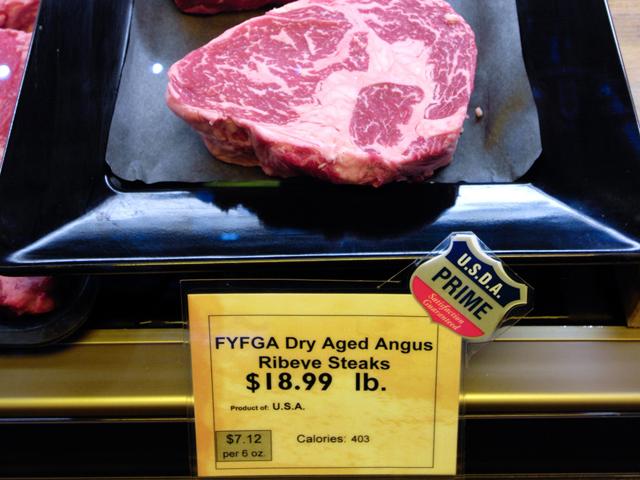Product of USA Label
Beef Groups Respond to USDA Proposal for Labeling US Beef
A proposal by USDA for tying new requirements to "Product of USA" label claims is bringing up a lot of old discussions in the beef industry.
USDA's new requirements are, according to the agency, meant to better align the voluntary label with a consumer understanding of what it actually means for something to be a "Product of USA" or to be "Made in the USA." Current policy allows imported meat to have a "Product of USA" label if it passes through a USDA-inspected plant.
The shift falls under the Biden-Harris administration's plan to build a more competitive, and more resilient, meat and poultry supply chain. It follows a comment period that began in July 2021, a survey, and a review by USDA of current labeling rules. The survey reported that a significant portion of consumers believed current labeling meant the product came from animals born, raised, slaughtered, and processed in the U.S.
Agriculture Secretary Tom Vilsack said at the time the proposal was released that the changes would "provide consumers with accurate information to make informed purchasing decisions. Our action today affirms USDA's commitment to ensuring accurate and truthful product labeling."
P[L1] D[0x0] M[300x250] OOP[F] ADUNIT[] T[]
The changes would allow the label claim only to be used on animals born, raised, slaughtered, and processed in the U.S. It extends to egg products. It would be voluntary. It would require no pre-approval by USDA's Food Safety and Inspection Service (FSIS) before being used but would require "supporting documentation to be on file" for agency personnel to use for verification.
A comment period on the proposed changes is open and can be found here: https://www.regulations.gov/….
Here's a breakdown of how some groups in the U.S. beef industry are reacting to the proposed rule:
-- Farm Action and American Grassfed Association: These groups drafted a petition for USDA to stop allowing imported meat to bear a "Product of USA" label back in 2018. That petition has been referenced by USDA. The groups called current policy a "heavily exploited loophole (that) has allowed multinational corporations to import meat, repackage it, and pass it off as a higher-quality product raised by U.S. farmers and ranchers." The groups said the USDA proposal is an important step in closing the loophole and applauded the effort. "After a five-year fight, we're pleased to see the USDA stepping up to stop the cheaters picking the pockets of America's farmers and ranchers," said president and co-founder of Farm Action, Joe Maxwell.
-- North American Meat Institute: Meat Institute President and CEO Julie Anna Potts commented on USDA's proposal, noting that the move is "likely to result in trade retaliation from Canada and Mexico, costing American consumers and businesses billions of dollars." She said that more than public sentiment should be considered in making the decision, and noted Meat Institute members invest in beef, pork, lamb, veal and poultry products in American facilities and employ hundreds of thousands of workers in the U.S., with their processes overseen by USDA food inspectors. The food that goes through these processes, she said, should be labeled a "Product of the USA."
-- National Cattlemen's Beef Association: Executive Director of Government Affairs for NCBA Kent Bacus said in response to the USDA proposal that "We cannot afford to replace one flawed government label with another flawed government label." He noted the current policy and label is flawed because it doesn't allow U.S. cattle producers to differentiate their beef in today's marketplace. He said NCBA has been working to find voluntary, trade-compliant solutions. "Simply adding born, raised, and harvested requirements to an already broken label will fail to deliver additional value to cattle producers and it will undercut true voluntary, market-driven labels that benefit cattle producers," Bacus stressed.
-- R-Calf United Stockgrowers of America: Bill Bullard, R-Calf USA CEO, said USDA's new proposed label misses the mark. While he praised the portion of the rule that is intended to stop the practice of labeling beef that has merely been "repackaged in the United States" as a "Product of the USA," he took issue with a portion of the rule that addresses meat sliced and packaged in the U.S. He said using the term "United States" on any label will be enough for most busy consumers to see, and then assume, that the product is produced in this country. He calls this a "loophole" and a "psychological marketing tactic." Ultimately, Bullard said, the group does not like the proposed rule and views it as a distraction from what he calls "the real solution," that in his opinion would be the enactment of the American Beef Labeling Act and enforcement of the Tariff Act of 1930.
-- U.S. Cattlemen's Association: The USDA proposal follows a 2019 request made by this group to stop allowing U.S. label claims on beef that could come from other countries. USCA President Justin Tupper, in response to the new proposed label rules, said the group is "pleased to see that the proposed rule finally closes this loophole by accurately defining what these voluntary origin claims mean, something we have been working to clarify since the repeal of mandatory country-of-origin labeling in 2015. If it says 'Made in the USA,' then it should be from cattle that have only known USA soil. Consumers have the right to know where their food comes from, full stop." He thanked the Biden administration for including this proposed change in its "Action Plan for a Fairer, More Competitive, and More Resilient Meat and Poultry Supply Chain" issued last year.
Victoria Myers can be reached at vicki.myers@dtn.com
Follow her on Twitter @myersPF
(c) Copyright 2023 DTN, LLC. All rights reserved.





